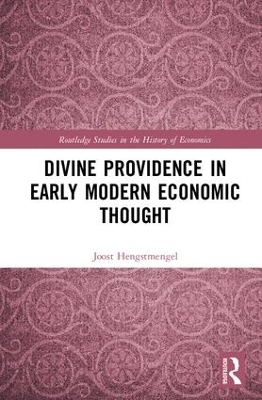
Divine Providence in Early Modern Economic Thought
Seiten
2019
Routledge (Verlag)
978-0-367-19456-7 (ISBN)
Routledge (Verlag)
978-0-367-19456-7 (ISBN)
This book examines the doctrine of divine providence and how it served as explanation and justification in economic debates in the sixteenth, seventeenth and eighteenth centuries throughout Western Europe.
In this important volume, Joost Hengstmengel examines the doctrine of divine providence and how it served as explanation and justification in economic debates in the sixteenth, seventeenth and eighteenth centuries throughout Western Europe. The author discusses five different areas in which God was associated with the economy: international trade, division of labour, value and price, self-interest, and poverty and inequality. Ultimately, it is shown that theological ideas continued to influence economic thought beyond the Medieval period, and that the science of economics as we know it today has theological origins.
Interdisciplinary in nature, this book will be of interest to advanced students and researchers in the history of economic thought, the history of theology, philosophy and intellectual history.
In this important volume, Joost Hengstmengel examines the doctrine of divine providence and how it served as explanation and justification in economic debates in the sixteenth, seventeenth and eighteenth centuries throughout Western Europe. The author discusses five different areas in which God was associated with the economy: international trade, division of labour, value and price, self-interest, and poverty and inequality. Ultimately, it is shown that theological ideas continued to influence economic thought beyond the Medieval period, and that the science of economics as we know it today has theological origins.
Interdisciplinary in nature, this book will be of interest to advanced students and researchers in the history of economic thought, the history of theology, philosophy and intellectual history.
Joost Hengstmengel is a postdoctoral researcher at the Tilburg School of Catholic Theology, Tilburg University, the Netherlands.
1. Introduction 2. The history of divine providence 3. International trade: God’s universal economy 4. Division of labour: the divine ordering of society 5. Value and price: a providential abundance of necessities 6. Self-interest: the invisible hand of God 7. Poverty and inequality: rich and poor God-willed 8. Conclusions
| Erscheinungsdatum | 13.05.2019 |
|---|---|
| Reihe/Serie | Routledge Studies in the History of Economics |
| Verlagsort | London |
| Sprache | englisch |
| Maße | 156 x 234 mm |
| Gewicht | 489 g |
| Themenwelt | Schulbuch / Wörterbuch ► Wörterbuch / Fremdsprachen |
| Geschichte ► Allgemeine Geschichte ► Neuzeit (bis 1918) | |
| Geschichte ► Teilgebiete der Geschichte ► Wirtschaftsgeschichte | |
| Religion / Theologie ► Christentum ► Kirchengeschichte | |
| Geisteswissenschaften ► Sprach- / Literaturwissenschaft ► Anglistik / Amerikanistik | |
| Geisteswissenschaften ► Sprach- / Literaturwissenschaft ► Literaturwissenschaft | |
| Geisteswissenschaften ► Sprach- / Literaturwissenschaft ► Sprachwissenschaft | |
| Wirtschaft ► Allgemeines / Lexika | |
| Wirtschaft ► Volkswirtschaftslehre ► Wirtschaftspolitik | |
| ISBN-10 | 0-367-19456-2 / 0367194562 |
| ISBN-13 | 978-0-367-19456-7 / 9780367194567 |
| Zustand | Neuware |
| Informationen gemäß Produktsicherheitsverordnung (GPSR) | |
| Haben Sie eine Frage zum Produkt? |
Mehr entdecken
aus dem Bereich
aus dem Bereich
Giordano Bruno - ein ketzerisches Leben
Buch | Hardcover (2024)
C.H.Beck (Verlag)
29,90 €
das dramatische 16. Jahrhundert
Buch | Hardcover (2024)
Rowohlt Berlin (Verlag)
34,00 €


